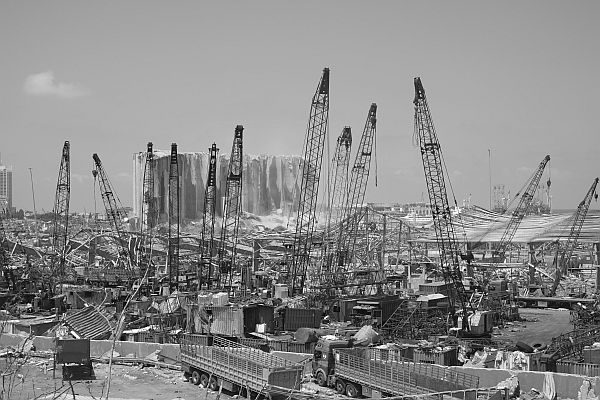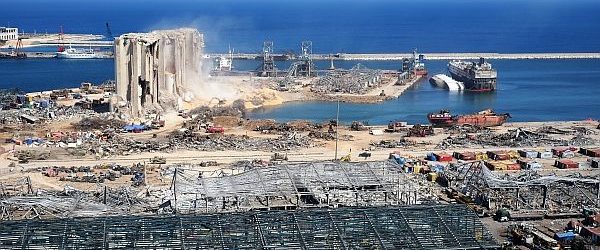‘Are we in August? Yes. We are in August.’
Mahmoud Darwish, Memory for Forgetfulness: August, Beirut, 1982
When did August end in Beirut? I am standing one degree between over there and somewhere, and I cannot hear an answer.
There is Beirut, a city which holds Lebanon’s heart over the edge of the Mediterranean Sea. Within its grip, the months do not pass with a normal collection of days, but spell out the words ‘life sentence’. Before I see an end to August, I wonder when it began. Possibly at the moment of conception: when the rocks forming roads for us to reach each other were told you are now a nation. Or possibly during those years of civil war that are not letting us go despite the long passage of time. The years 1975-1990 smudged out in one dark blot. A war that raised my father into adolescence, before he fled to Australia, in 1988.
Since my parents gave me July and not August, I preoccupy myself with searching for traces of my father’s war. This led me to Memory for Forgetfulness, a small book of prose by the formidable Palestinian poet Mahmoud Darwish. The book chronicles Darwish’s experience of the Israeli invasion of Beirut, a three-month long onslaught of violence during the summer of 1982.
Darwish remembers those days of August, their sharp-jagged edges and their anguish. Following his words, I watched the Israeli jets spill out from the sea, pouring an endless stream of shells into the city. I saw how the sea and the sky parted ways, clearing a path for metallic birds whose offspring collapsed onto homes beneath. How the air itself fused into metal and sought out human flesh, and the waves burst forth baring stray shrapnel. ‘Hiroshima is tomorrow’, Darwish wrote, knowing that this, too, was born of August.
Almost four decades since the Israeli invasion, recent cataclysmic events imbue Darwish’s prose with new prophetic meaning. I can no longer read of August 1982 without remembering August 4, 2020, at 6:08 pm. At this moment, half of Beirut crumbled under the force of the 2750 tonnes of ammonium nitrate that exploded in the city’s port.
In Beirut, the port holds back the sea from the streets of Mar Mikhael and Gemmayzeh, home to the city’s nightlife district. Here in August 2019, a year before the explosion, I caught glimpses of the dreams of Lebanon’s youth. I began to nurture a dream of my own: of one day returning to the city to which, although never actually mine, I owed my very blood. But Beirut already held too much.
Long before the blast, the port was tied up in the bloodstained pages of Lebanese history, as a strategically important site and civil-war bargaining chip with countless battles and massacres to its name. The warlords who emerged victorious from those battles won the city, the nation, and its future. They then allowed 2750 tonnes of ammonium nitrate to remain unsafely buried within the heart of Beirut for seven years until August 4, 2020, at 6:08 pm. It exploded with the weight of the entire Mediterranean on its back, as if the combined force of every shell which had ever been thrown at the city fused into one fatal blast. The apocalypse of August 1982 resurfaced, and as I watched half of Beirut in ruins on the small screen of my phone, I heard the echo of Darwish’s words:
The sea is walking in the streets. The sea is dangling from windows and the branches of shrivelled trees. The sea drops from the sky and comes into the room. Blue, white, foam, waves. I don’t like the sea. I don’t want the sea, because I don’t see a shore, or a dove.
There are no doves in August, only birds dead in the street. In one of the protests that have continued since October 2019, a bird suffocated to death on tear gas meant for resisting youth. ‘The birds stop singing,’ Darwish lamented, ‘and pay heed to the war’. On an Instagram livestream, I watched a young protestor crying while trying to revive a bird. Perhaps she hadn’t heard Darwish’s warning. Perhaps, she was only searching for a small heartbeat to assure herself that her country and its people were not long dead; that one day, the doves would return, and the waves would recede, back into the Mediterranean.
The heartbeat was found buried under the rubble. A month after the blast, a Chilean rescue team detected signs of life below a crumbled building in Gemmayzeh. They believed a child was trapped, but after three days of excavation, they found no-one. An empty room hiding the phantom heartbeat of a child that never existed. The perfect tragedy for a nation never able to grow into its existence, buried alive under the rubble. It doesn’t matter that the child didn’t exist, the crime and its victims were assured long ago. The phantom pain was enough, and Darwish knew this when he wrote:
I am terrified of falling among the ruins, prey to a moaning no one can hear … I’m now there, in the rubble. I feel the pain of the animal crushed inside me. I cry out in pain but no one hears me. This is a phantom pain, coming from an opposite direction – out of what might happen.
I know phantom pain best, an injury that hovers without belonging to you. From inside of it, I am trying to write about Beirut. But truly, I know nothing about August 1982, nor August 2020. For me, it was August 5, 2:08 am, and I was in Brisbane, Australia, in my bed and about to sleep. Here, I witnessed the blast through an endless feed of videos. I watched the city that I love, more than I probably have a right to, explode from every possible angle.
Before the blast there was the burning. I remember Darwish’s words, ‘Beirut in August is not in need of a new fire.’ The blast was, perhaps, the quickest concentration of destruction in an otherwise drawn-out process of strangulation. It is difficult to talk about the blast without mentioning the fires, the floods, and the homes without electricity, food or water. The streets choked on teargas, the students beaten by soldiers, the protestors shot in the eyes or killed in front of their children. It is difficult to say anything without mentioning the economic crisis: the Lebanese Lira, plummeting and plummeting, and now in the ground, worth less than nothing. Futures patiently saved for, cashed in by bankers sponsored by the Lebanese state. A hundred thousand applications for foreign visas in one month alone. Death has too many faces, and the spectators only watch for as long as one media cycle lasts.
After a brief tour of discomfort, the world left August behind with September. Memory, I’m told, is merely intended to serve unfortunate intervals in between forgetting. But in my room in Brisbane, a phantom pain persists. In the months after the blast, someone asks me where I’m from. I answer: here, but my father is Lebanese. On the phone he says, ‘As a father, I’m sorry to have given you such a homeland.’ Someone asks me what the capital of Lebanon is. I answer: Beirut. These words are so common place, but why does my heart ache when I say them? The only answer I find comes from August:
Does a bomb have grandchildren? Us.
Does a piece of shrapnel have grandparents? Us.
And the silence, the silence of the spectators, has turned into boredom.
One month lasts a lifetime.
‘But one second is long enough for me to burn.’
Image by Rashid Khreiss





